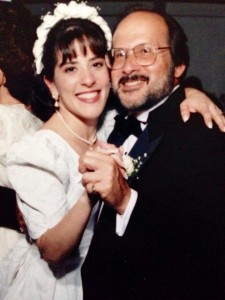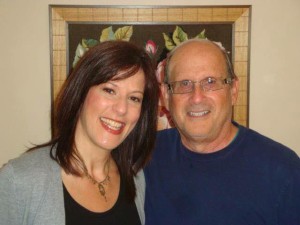
This week we welcome guest blogger, Deborah Greene, who lost her father to suicide on April 20th, 2015. She offers her reflection on the last conversation she had with her father prior to his death. We thank Deborah for a sharing a piece of her grief journey with us.
In one of the last conversations that I had with my father, I recounted an episode of severe depression that he’d experienced when I was a child. He had left his job after reaching the position of partner at a successful accounting firm. But he was deeply unhappy & unfulfilled at work. So despite the security his position offered, he submitted his resignation. And almost immediately after doing so, the demons of self-doubt and worry filled his head. The job loss served as a trigger and my father quickly spiraled into a very dark place.
He was agitated and easily angered. I remember hearing him and my mother fighting, how he yelled at her, directing all of his fury her way. I remember how withdrawn he became. He was functional enough to search for another job, but in every other way he was lost to us emotionally. 
My brother and I used to wake to his cries at night. He couldn’t sleep, so he would go downstairs and yell at the top of his lungs, railing at God and at himself. But hardest of all were his words about wanting to die. He would cry out that wanted to kill himself, that he would be better off dead. “What have I done?” he would ask. He would berate himself, a form of verbal self-flagellation. And this was a nightly experience for my brother and me.
I would ask my mother if he was going to be okay. I would go off to school wondering if my father would take his own life while we were all out of the house. I was frightened, confused and profoundly sad. I cried a lot.
Eventually, my father got help. He went into therapy long enough to get through the crisis. He got another job. He stopped therapy. And we never really talked about it after that.
As my father sank further into the depths of his despair last April, he and I finally revisited that painful chapter. I raised it in an effort to remind him that he had been in this dark place before. I thought it might help if he could see that there had been a reserve of strength and resilience that carried him through the darkness then. I hoped it might offer a glimmer of hope and faith that somewhere deep inside of him, there still was.
As we talked for the first time about that painful chapter in our family’s history, my father apologized to me. Not one to ever offer apologies easily, he acknowledged that it must’ve been a very scary and painful experience for me and my brother. He shared his profound sorrow that his young children had to leave the house each day worried about what they would find upon their return home. He verbalized for the first time the impact that we must’ve felt as we heard our father cry out nightly about wanting to end his life. “I’m so sorry that I never acknowledged it before “he said. Through my own tears I let him know that I had long ago forgiven him.
The truth is, we didn’t know what depression really was. We didn’t understand it so well back then. Dark clouds came, we lived through the storm and when the sun returned we simply moved on with our lives. We carried our scars, but we kept them hidden. We didn’t talk about them. That childhood episode was not something my father did to us, it was not purposeful. But for the first time we could acknowledge that depression reaches deep into the heart of a family, not just the soul of the one who is diagnosed.
Just a short time after we had that emotional and honest phone call, my father took his own life. I can recall how confused I was by it all. How could he apologize for the pain that his words about suicide had once caused us, yet now leave us in this way? It didn’t make any sense to me and I was angry.
But in time I began to see it differently. That conversation offered a moment of heartfelt clarity for my father. He saw that depressive episode in a way that he had never been able to before, acknowledging to himself and to me the painful impact it had on those he loved and cherished most in this world. And he hated knowing how deeply it had hurt us. Because hurting us is the last thing he would ever want to do.
That is what allows me to believe that if my father had been able to step outside of his own suffering and look at the painful aftermath his suicide would cause, he wouldn’t have left us. It allows me to cleave to the notion that whatever he felt in his final moments was so dark that it clouded his mind, blocking out the images of love and life that were a part of his world. It tells me that my father never wanted to hurt us and that if he believed his pain could end in the world of the living, he would have fought on. 
My father’s suicide was not a selfish act. It was not the act of a coward. It was the act of a man who was in agony and didn’t want to hurt anymore.
It doesn’t make it easier to live with. It has left a traumatic imprint that we who loved him most will carry forever. But that conversation allows me to forgive him and to better understand his death. And just as importantly, it allows me to forgive myself for not being able to save him.




Thank you so much for posting. This really hit home for me and I believe also if my dad knew the aftermath, things would be different. The last thing he would have wanted was to cause us pain but his pain, fear and misery was more than he could handle. Thank you again
How interesting…. my mother apologized too before leaving. It’s as if they needed us to know that they were aware of the suffering caused by their own troubled mind and then, after almost asking for forgiveness, they decided to end the cycle. In a way, I am proud of our parents, for their final effort and strength. One last time, they took responsibility before moving on with their death. Bless you and your family Deborah! And thank you for sharing your story. -Estelle
This struck a chord with me too. My youngest son, who passed away 28/7/14, aged 29, also apologized to me some weeks/months before his death. He had had a very troubled childhood, and yes, hate to admit it, but he had been very difficult to parent. He said sorry for being such a terrible child, or words to that effect. I responded awkwardly, “no, you weren’t really”. Interesting, how we look back, and realize he was preparing then to end his pain. No, I was not a perfect parent, and don’t blame him in any way. Just so sorry that he is not around to enjoy the sometimes good times in life.
Please notify me of any follow-up comments and new posts. thanks.
Hi Claire-
You can subscribe to our blog on the main page. You will see a subscribe button on the right hand side. You can also subscribe to comments for a specific post, at the end of the post you would like to subscribe to.
I’ve been reflecting a lot on this conversation as the one year anniversary of my father’s suicide passed yesterday. I don’t know if he was saying a goodbye, but I know that it helps me to believe that if he had the capacity to step outside of his pain and anguish in those last moments, he would have spared us this pain. The notion that he could think of our suffering and go forward with his suicide anyway was too hard to bear. That made it feel selfish and in order to find my way past the anger to forgiveness, I had to let that notion of selfishness go. Who knows how long he held on for us, how many days he fought on just for us. We will never know, the answers will never come. And that conversation has morphed in it’s meaning over time. I am grateful to have found a place for it that brings me some understanding. It doesn’t make it better or easier, but it dulls the edges. And that helps… wishing us all continued healing on this journey through traumatic loss. May we all have some words to cleave to that bring us some comfort.